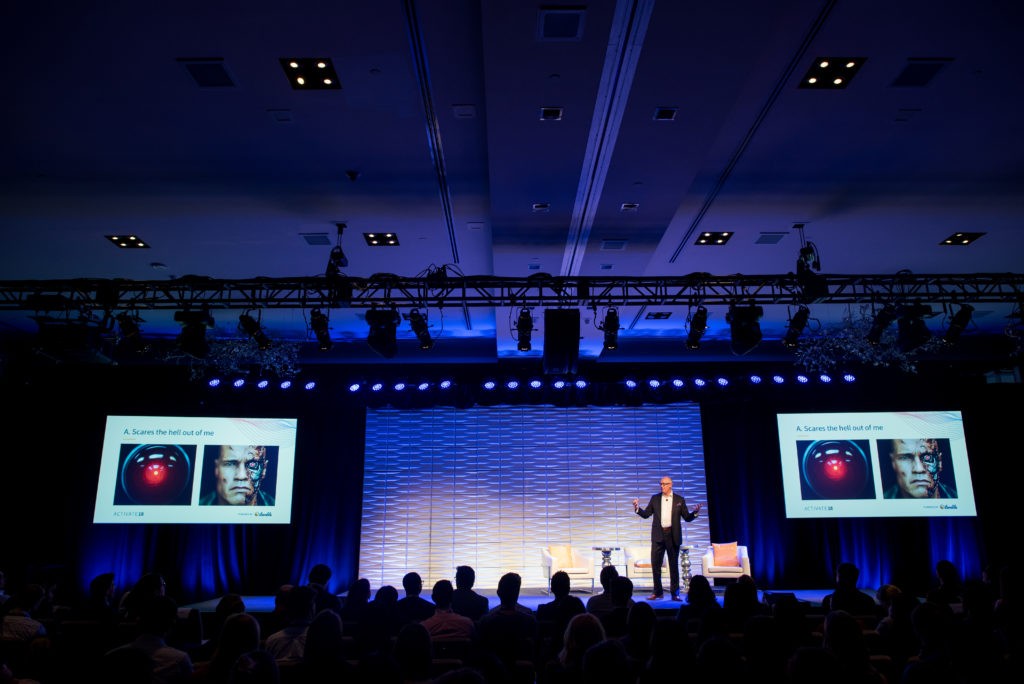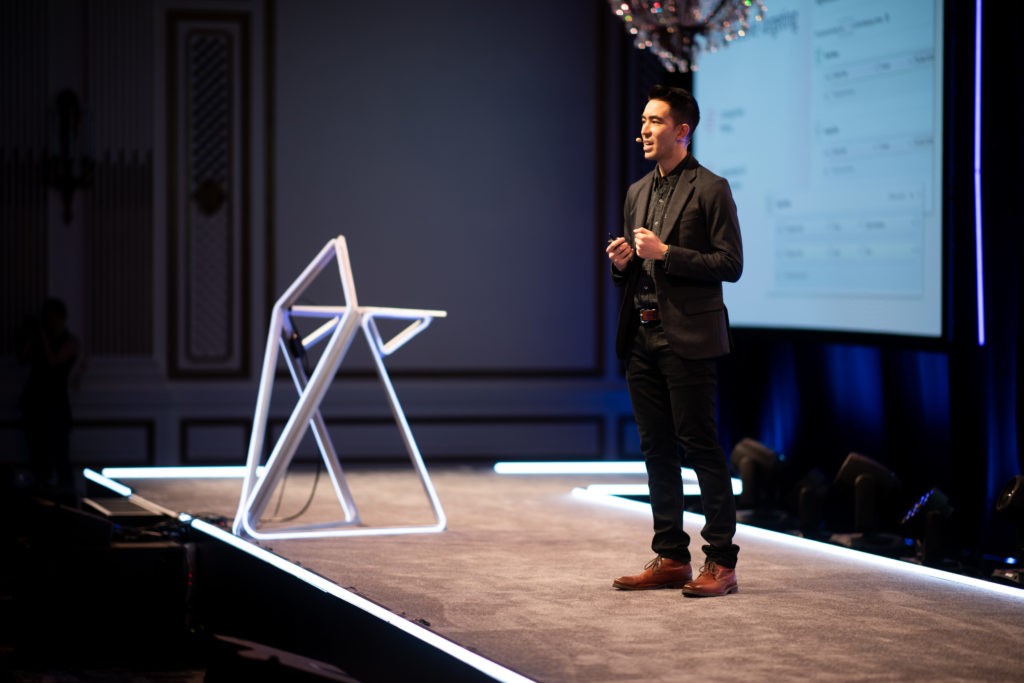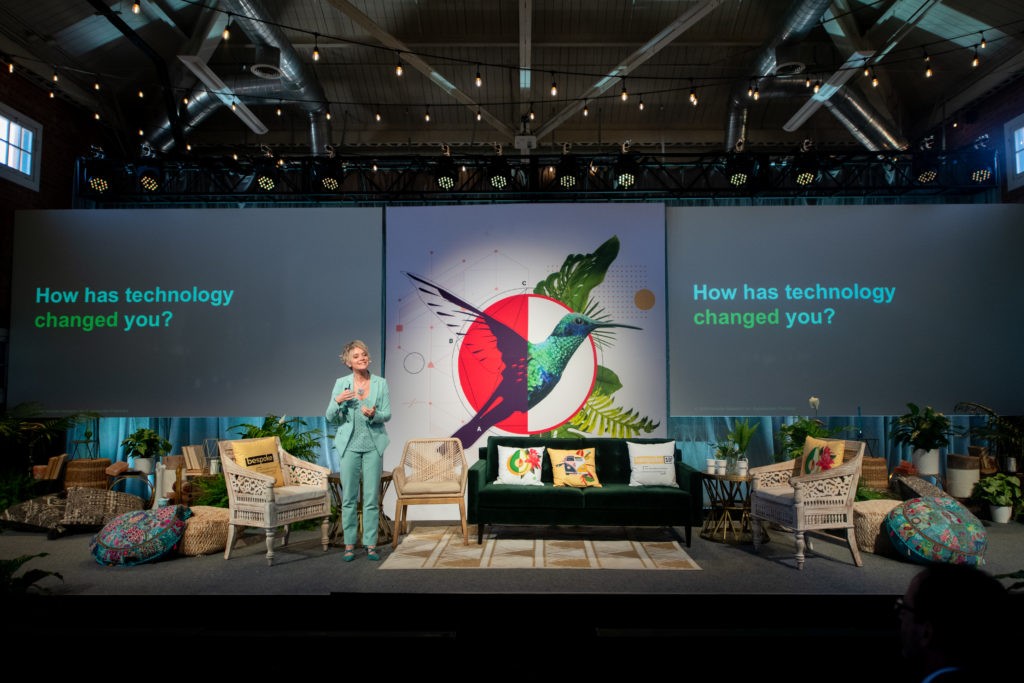Each month we profile one inspiring individual who is raising the bar in the meetings & events industry. Read on to learn why Ben, Vice President at Mountain View Staging, is our March 2020 #Eventprof of the month.
We first met Ben when we were bidding out an audio-visual production for a first-time user conference, and we’re so lucky we did.
At the time, he was an Executive Producer at Mountain View Staging, an audio-visual production company based in Utah with a nationwide footprint. Although he’s based at their Silicon Valley location, we’re glad we crossed paths, as he’s often out traveling for clients.
What we love most about Ben is his creativity. He has this amazing sense for both visuals and room setups, along with extensive technical insight. Ben’s always ahead of the curve when it comes to what’s new & trending in audio-visual like LED walls, projection mapping, and holograms, and takes the time to explain what it all means. He’s great at advising us and our clients on what actually makes sense to pursue based on budgets, content, and goals.
We’ve done everything from a basic projector & screen package for a roadshow to highly produced keynotes and concurrent breakouts for user conferences.
I think you can tell that we’re beyond grateful to have him as a valued partner and an extension of the Dynamo team.

Iterable Activate, 2018
Here are 10 questions with our March feature, Ben Kristy
1. What initially drew you into the events industry?
I’ve had a passion for planning events since I can remember growing up in Iowa. My first event was a hardcore punk concert in a barn. It’s funny to think back to it – 3 friends and I installed a stage, small PA, lighting, and old CRTs TVs connected to a camcorder on the balcony of the barn for an audience of 300 kids – quite possibly every kid in the county. I realize now that I treated all of the work as a creative outlet – post-event I was hooked and continued to find ways to be a part of live events.
2. What’s a day in the life of Ben like?
A day in my life can get pretty intense! Almost year-round I am producing several events at a time and working with my internal team. Being immersed in the event world has taught me to organize information as it flies at me, prioritize the work, and structure my day to avoid burnout from long periods of focus.
3. How do you feel your role helps advance your company’s overall goals?
As VP of Production at Mountain View Staging, I have my finger on the pulse of all events we design & support. Since my involvement, we have seen an increase in volume and profit. Driving our business development team who targets opportunities for our Account Managers. This pushes work to our team of PMs and on staff lead technicians.
4. How many events do you work on per year? What’s the mix?
In 2019 I personally produced 131 events and interacted with dozens of other production support roles 😊😓. MVS did 300 + in 2019 and moving into 2020, will see an uptick in virtual & simulcast events.
The mix: Annual/tour based Keynotes, Breakouts, Expos.
The Size: Ranges from 15,000+ attendees & 20,000+ viewers to very small virtual meetings and MVS sponsored events. Our sweet spot is supporting events between 500-2,500 attendees, designing high-end productions into medium & small spaces.

Iterable Activate, 2019
5. What is your favorite venue you have worked in, and why?
The Warfield in San Francisco. It’s a historic old theater that is great to work in. I love loading in or out here while brushing shoulders with the touring acts. The unique green room area that leads to the old speakeasy below the theater is something paralleled by few other spaces I’ve worked in.
6. How do you measure success for the events you manage?
Measuring an event’s success is the most important question we can ask. I see event success, in my client’s eyes, tied to the experience of planning and perception of execution. I have a friend who used to manage Robert Plant’s tour. He would say “this appetizer is the most important part of the show” I never used to understand why it wasn’t related to what was hanging on the truss. I now realize all the little details matter and we need to hone in on what matters to our client.
7. What was your biggest event fail, and how did you overcome it?
My biggest event fail had me considering moving on from working in the event industry. I was managing an event that went south when suddenly the keynote speaker’s microphone did not work, nor did the second, and nor did the third! We did not know it but were experiencing radio interference from satellite trucks that had parked just outside the event and were broadcasting an interview. I was able to juggle the live event while identifying the problem and getting microphones that did not overlap with television frequencies. To make things worse, I had a client who was following me around yelling at me in front of attendees. I was silent until everything was fixed. Someone from the hotel came up to me and escorted me out of the room – low moment.
That was the first event failure I had experienced and was ready to find a new career. A friend and mentor of mine convinced me to get up, try again, and not look back.

Cordial Bespoke 2019
8. What’s a tool that’s saving you time in your job?
Saving time at work is important and I think it starts with strategic communication. Knowing when to make a phone call, send a text, hold off on a brief response to write a better email, and sometimes just letting something breathe for a day. That strategy is the number one time management tool I use.
9. Where do you find inspiration?
Inspiration is important to me and I have almost no rule in who can inspire me. I am most focused on feeding my design philosophy and process and my main inspirations are the Artists, Architects, Scientists, Mathematicians, Actors & Musicians, Good guys, Bad guys of the world. They are all philosophy driven people with inspiring processes and innovative ideas.
My favorite inspiration: James Turrell
Turrell’s medium is pure light. He says, “My work has no object, no image, and no focus. With no object, no image, and no focus, what are you looking at? You are looking at you looking. What is important to me is to create an experience of wordless thought.” It influences my broadcast and creative lighting approach.
10. Any advice for #eventprofs just getting started?
Just start doing it and don’t wait to be invited! So much of what we do is logic-based and can be learned through observation and doing work. I used to work in a warehouse and drive a truck for a company with over 60 locations in the San Francisco area. Sometimes the driving shifts were 16 hours, refueling multiple times and driving in inner-city San Francisco. People saw I was smart and dedicated to the task in front of me. I was quickly pulled into bigger and better projects, eventually never available to drive or work in the warehouse again!
Start now because dedicated and talented #eventprofs are in high demand! 😎



 Blog home
Blog home